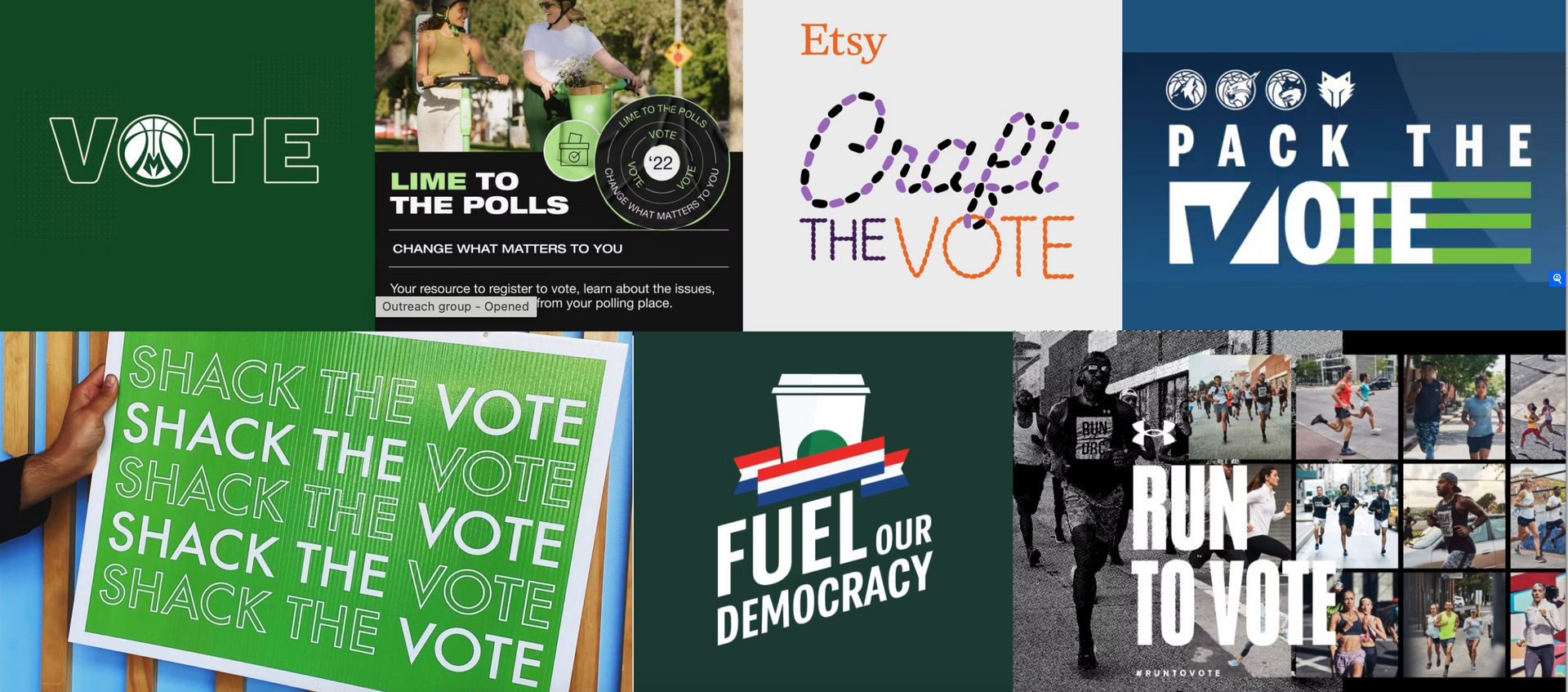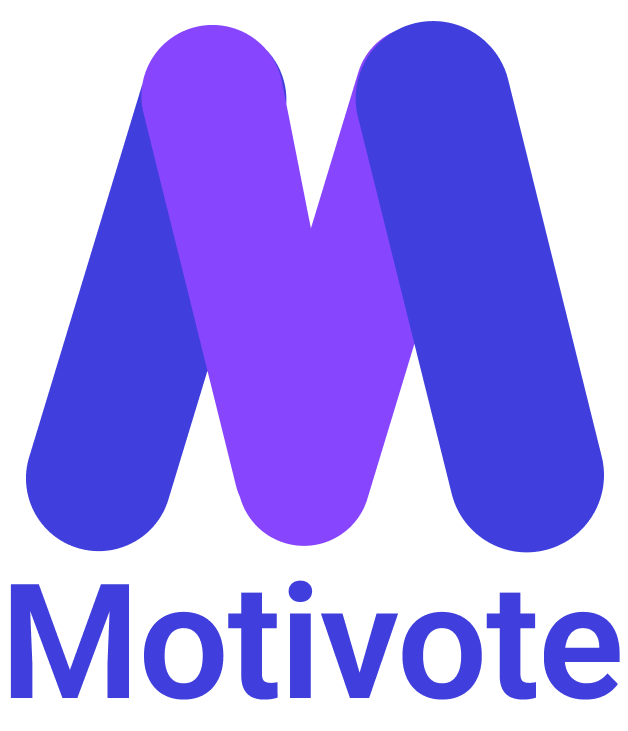Benefits of Corporate Civic Engagement
Use this resource to understand the "ROI" for corporate civic engagement and make the case for your company's investment in democracy — be it sharing election resources, encouraging participation, offering paid time to work at the polls, or other ways to engage.
What is Corporate Civic Engagement?
Corporate Civic Engagement describes "How a company empowers people to participate in shaping the affairs of their community and nation through the democratic process. These company policies, practices, and communications—whether for employees or external audiences, and whether to encourage education or action—are conducted without regard to political party, platform, candidate, or outcome" (Civic Alliance).
You can also think of this concept as "Corporate Civic Responsibility (CCR)" — a dimension of the field of Corporate Social Responsibility: "At the core of CCR is the idea that civic health is vital to our future, just like our natural resources. In the same way that our communities need clean water to thrive, they also need politics to function well and allow them to implement public choices on important issues. So when a business seeks to improve the workings of politics itself, it is helping to preserve a vital public resource. This is civic engagement of the best possible kind. It is not about businesses using their political power to advance corporate interests; it is about businesses working with their employees, customers, and community stakeholders to strengthen our democracy." (Business For America).
Why Are More Companies Getting Involved?
Compared to a couple election cycles ago, companies will play a much bigger role in encouraging participation and providing resources to employees and customers.
As just one example, the membership of Time To Vote (an initiative to ensure workers have paid time to vote) grew by 400% since its founding in 2018 and now includes over 2000 companies.
Why are so many companies getting involved in democracy — be it sharing election resources, encouraging participation, offering paid time to work at the polls, or other ways to engage?
Businesses benefit from a stable economy and strong public institutions. 81% of business leaders think that businesses should act to protect democracy and ensure safe and fair elections, according to Morning Consult. The Civic Alliance finds its member companies outperformed their peers on the S&P 500, suggesting positive investor and market response to companies engaging on democracy issues.
It’s well established that Gen Z and Millennials prioritize social impact, and civic participation is no exception. Employees are looking to their employers for resources that help them get involved in their communities – and they want companies to walk the walk with actionable steps, not merely pay lip service. BIPAC’s latest survey finds a rise in demand among younger employees for election information.
Companies realize they can have an outsized impact on voter participation. While trust in institutions like media and government wanes, employers consistently rank highest on trust indexes. Unlike political campaigns, which target the voters most likely to vote for their candidate, companies reach broad audiences of less likely voters – like young people and historically disenfranchised groups. Companies also have built-in channels for communicating with employees, so they can break through the noise with encouragement and information.
Companies are drawing clear connections from democracy to their broader mission. For example, companies that care about sustainability know the impact of environmental policy and leadership on those efforts. Civic participation also positively impacts physical and mental health, making it a no-brainer for healthcare and wellness companies..

Suggested Framing
We've compiled some of the most compelling frames for getting your company involved in democracy. Select the ones that make the most sense for your leadership and broader mission.
- Businesses perform better in democratic societies. Because companies do better in stable democracies, supporting democracy is aligned with shareholder profitability.
- Businesses need functional institutions and public processes to thrive. Think about the impact of polarization and the gridlock it creates.
- Voting and democracy issues directly impact your corporate goals and values. From workforce education to supply chain sustainability to regulations for your industry, it's not hard to see how elected officials and policy decisions shape business outcomes.
- Corporate Civic Engagement is a continuation of the decades-long shift toward business as a force for social good. Through frameworks like ESG, companies are improving their bottom line while improving the world around them. Civic engagement is another tool that leaders can use to promote "doing well by doing good."
- Civic engagement initiatives create opportunities to build employee relationships and community, which leads to more engaged teams. Millennials and Gen Z prioritize opportunities for impact more than previous generations and are looking for a sense of purpose. When people engage in altruistic activities, they gain a sense of purpose and belonging. This can translate into stronger relationships and trust, which benefits team dynamics and productivity.
- Civic engagement is good for mental and physical health. Higher rates of civic participation correlate to healthier stakeholders, including better psychological well-being, physical benefits, and emotional health. For companies that want to demonstrate they care about physical and mental well-being in their communities, investing in civic engagement is a win-win.
- Companies gain an edge when their employees understand how government works and participate in community processes. Especially in highly regulated industries, familiarity with civic processes improves productivity and outcomes. With the drastic decline in civics education in the US education system, employers can have an outsized impact. Legislators pay more attention to companies and consider them good corporate citizens when they know their employees are active and knowledgable.
- Engaging on Democracy issues also creates a positive brand association for your customers. Consumers have positive impressions of companies that support democracy Global Strategy Group found 81% of Americans are more likely to buy from companies that have encouraged people “to participate in our democracy by providing information about issues in their community and resources to help them register and vote.”
- On the other hand, it can now be seen as a business risk to not actively support Democracy because it's misaligned with stakeholder expectations. Survey respondents described companies who took a position on a political or social issue as “trustworthy,” “mission-driven,” and “bold. Companies that never took a position were “out-of-touch,” “selfish,”and “unpatriotic.”
Additional Resources
Research/Reports
- Corporate Civic Playbook (Civic Alliance)
- Corporate Support for Employee Voting (Trillium Asset Management)
- Civic Responsibility: The Power of Companies to Increase Voter Turnout (Harvard Kennedy School)
- In Their Own Words: Why Some People Find Voting Difficult (Pew Research Center)
- Demand for Employer-Provided Election Information on the Rise (BIPAC)
- Civics Inc: How Every Business Can Help Promote a Healthy Democracy (NationSwell)
- The Business Case for Civic Education (Harvard Business Review)
Articles/Blogs
- A Business Approach to Reinforcing Democracy (Business for Social Responsibility)
- Can Healthy Democracy Support Your Corporate Purpose? (Business For America)
- Corporate *Civic* Responsibility: A New Opportunity for Business Leadership (Business For America)
- Business Can’t Take Democracy for Granted (Harvard Business Review)
- The Latest Benefit Companies Hope Will Attract Top Talent? Civic Engagement Days (Inc)
- The Untapped Tool For Growth: Corporate Civic Engagement (Forbes EQ)
- Civic Engagement Seems To Be Good For Big Business (The Fulcrum)






